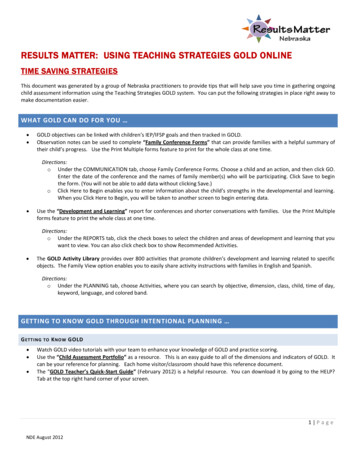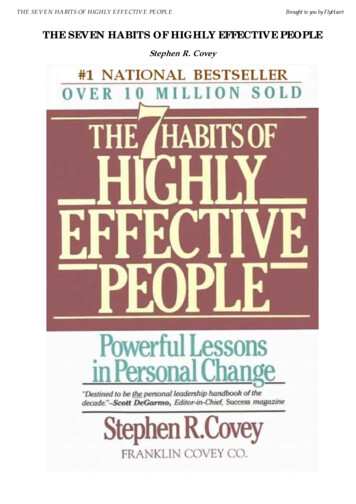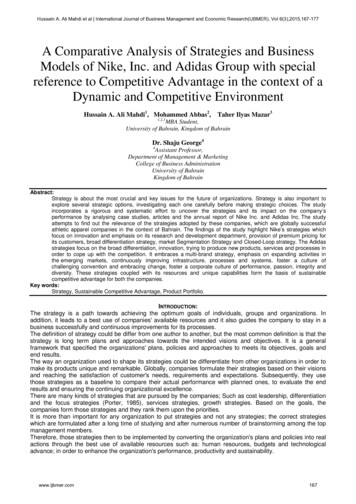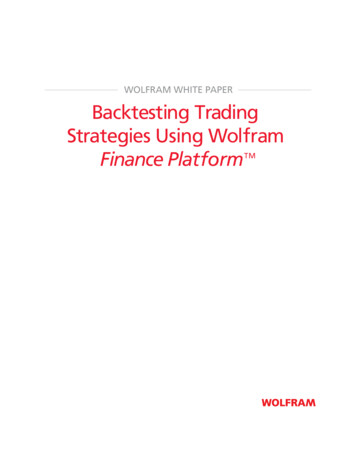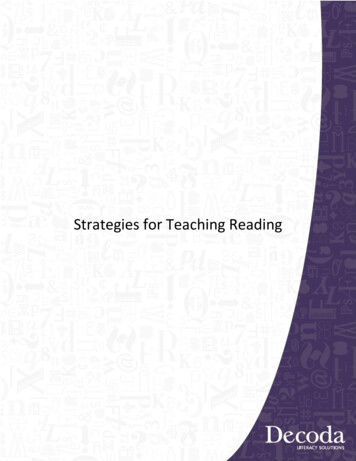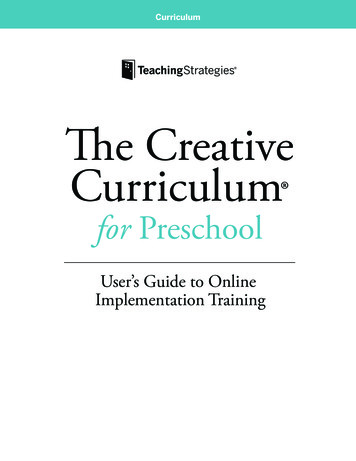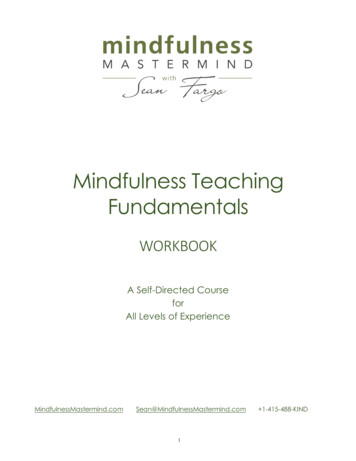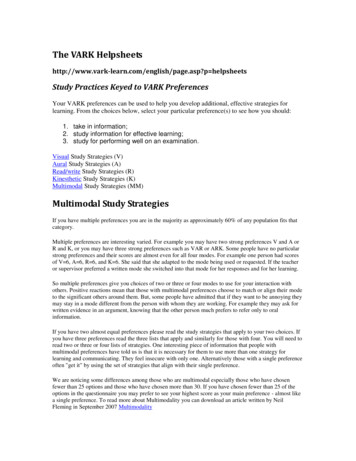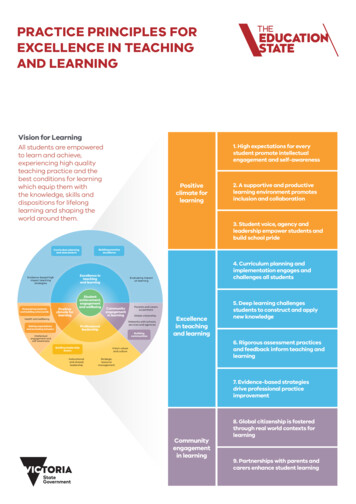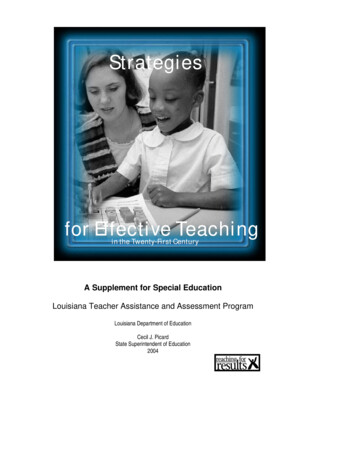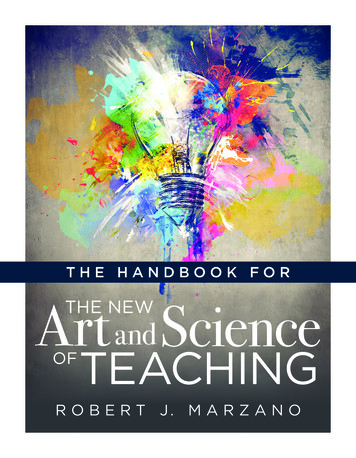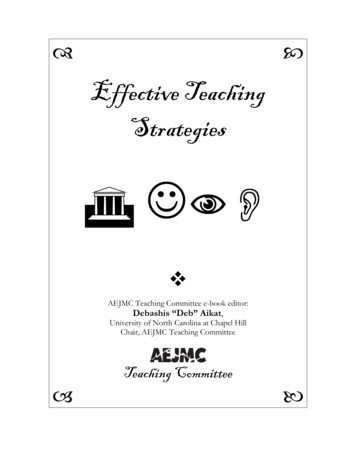
Transcription
Effective TeachingStrategies AEJMC Teaching Committee e-book editor:Debashis “Deb” Aikat,University of North Carolina at Chapel HillChair, AEJMC Teaching Committee Teaching Committee
AEJMC Teaching Committee e-book Effective Teaching Strategies Page 2 of 34 Copyright Information, Legal Notice and Disclaimer:Individuals and all establishments may photocopy this e-book withoutpermission – either for personal use or for use or distribution to students forclassroom use.Requests to reproduce materials in this e-book for any other purpose shouldbe directed to Ms. Jennifer McGill, Executive Director, Association forEducation in Journalism and Mass Communication ( AEJMC), 234 OutletPointe Blvd., Columbia, SC 29210-5667 Phone: 803-798-0271 Fax: 803-7723509 Email: aejmchq@aol.com. Only that office may grant the request afterassessing a fee.This publication is protected under the Copyright Law of the United Statesand all other applicable international, federal, state and local laws, and allrights are reserved, including resale rights.Please note that much of this publication is based on empirical researchresults, personal experience and anecdotal evidence. Although the authors,the editor and the publisher have made every reasonable attempt to achievecomplete accuracy of the content in this e-book, they assume noresponsibility for errors or omissions.Any trademarks, service marks, product names or named features areassumed to be the property of their respective owners, and are used only forreference. There is no implied endorsement if authors use one of theseterms.Copyright 2010 Association for Education in Journalism and MassCommunication. All rights reserved worldwide. AEJMC Teaching Committee e-book Effective Teaching Strategies Page 2 of 34
AEJMC Teaching Committee e-book Effective Teaching Strategies Page 3 of 34 Foreword: Effective Teaching StrategiesTHis e-book was germinated in the workshop on “Effective Teaching Strategies forJunior Faculty” sponsored by the AEJMC’s Committee on Teaching at the AEJMCconference in Denver. With lively discussions and a mentor meet-up, this interactiveworkshop featured proven strategies for effective teaching and developing mentoringrelationships.This compendium provides a treasure trove of information, ideas, strategies, trendsand wisdom that are relevant across the repertoire of our field. In preparing thiscompendium, I asked our distinguished panelists, my cherished colleagues on the AEJMCTeaching Committee and renowned scholars to perpetuate in print their ideas, tips andperspectives in a “Top Ten” list of wisdom points. Despite their busy summer (yes, relaxingsummers are a myth!), our authors were generous with their time and energy. Their responsewas overwhelming and, for me, editing this compendium became an enriching experience.This workshop marked a three-year pilot plan based on the “strategic directions”outlined by the AEJMC 2009 State of the Discipline report http://www.aejmc.org/ about/discipline/index.php . It addressed four objectives: (i)Examine what we teach, how we teach and allay anxieties about a discipline in transition; (ii)Adapt course content to the new realities of communication and draw upon core values; (iii)Harness research, creative and professional activity, media and industry support, professionalorganizations and community resources to incorporate curriculum changes, technologyinnovations and assessment of learning outcomes; and (iv) Develop peer-to-peer and comentoring relationships.Workshop participants were paired with individual mentors and received a TeachingHandbook of take-home tips, readings and resources to use throughout the year. While theworkshop focused on helping those new to academe, experienced educators participated andcontributed.The workshop speakers featured winners of the Scripps Howard JournalismAdministrator of the Year and Scripps Howard Journalism Teacher of the Year awards,renowned educators, and students who will celebrate and critique teaching in its current stateand style. They covered ways to incorporate assessment of learning outcomes, gradeinflation, student evaluations of teaching, student apathy and related issues in an age ofentitlement, research resources to enhance teaching, and the use of online tools and socialmedia for effective teaching. AEJMC Teaching Committee e-book Effective Teaching Strategies Page 3 of 34
AEJMC Teaching Committee e-book Effective Teaching Strategies Page 4 of 34 The workshop comprised four parts: Part I: The Seven Habits of Highly EffectiveTeachers; Part II: “Shoulda, Coulda, Mighta, Woulda”: Exchange of Teaching Ideas; and PartIII: Proven Ways to Flourish in Academe: A Mentoring Plan to Balance Teaching, Research,Service and Life; and Part IV: Mentor Meet-up. The workshop also addressed careeradvancement strategies: developing a dossier for tenure, promotion and continuingprofessional and scholarly development, as well as tips for balancing research, teaching,service and life.I am grateful to Jennifer H. McGill, AEJMC, for helping us host this workshop, RichBurke, AEJMC, for accounting support, Kysh Brown, AEJMC and Mich Sineath, AEJMC,for spreading the word through cyberspace. I also thank the entire AEJMC staff for theirhelp and support.If you wish to see some issues covered in future workshops, please share your ideaswith members of the AEJMC Teaching Committee (see list below). Thanks for yourparticipation in this important initiative.Deb Aikat, North Carolina at Chapel Hill da@unc.edu Chair, AEJMC Teaching CommitteeTeaching Committee Elected Members (2009-10): Debashis 'Deb' Aikat, (chair), University ofNorth Carolina at Chapel Hill , Linda Aldoory, University of Maryland, College Park , MarianneBarrett, Arizona State University , Sheri Broyles (vice-chair), University of North Texas ,Kenneth Campbell, University of South Carolina , Dane Claussen, Point Park University ,Jennifer Greer, University of Alabama , Kim Lauffer, Towson University , Birgit Wassmuth,Kennesaw State University. AEJMC Teaching Committee e-book Effective Teaching Strategies Page 4 of 34
AEJMC Teaching Committee e-book Effective Teaching Strategies Page 5 of 34 Schedule for AEJMC’s Committee on Teaching’sWorkshop on “Effective Teaching Strategies for Junior Faculty”Tuesday, August 3, 20101 p.m. to 6 p.m. / AEJMC session 010 Plaza Court 7 http://www.aejmcdenver.org/?p 2202Association for Education in Journalism and Mass Communication Elected StandingCommittee on TeachingWorkshop Session: Effective Teaching StrategiesModerating/Presiding:Debashis “Deb” Aikat, North Carolina at Chapel Hill, Scripps Howard FoundationJournalism Teacher of the Year 2003.1:00 – 1:15 p.m.Welcome and Introductions1:15 to 2:15 p.m.Part I: The Seven Habits of Highly Effective TeachersPanelists:Sandra Chance, Florida, Scripps Howard Journalism Teacher of the Year 2004Charles Davis, Missouri-Columbia, Scripps Howard Journalism Teacher of the Year 2008Elinor Kelley Grusin, Memphis, Scripps Howard Journalism Teacher of the Year 2007Andrea Appelhans, Denver, M. A. studentKirsten Cangilla, Denver, undergraduate studentWith inspiring stories and an array of individual insights, panelists will begin this interactivesession with brief remarks about the challenges and joys of teaching. Participants will sharetheir teaching tips and discuss effective teaching.2:15 to 2:30 p.m.: Break2:30 – 3:30 p.m.:Part II: “Shoulda, Coulda, Mighta, Woulda”: Exchange of Teaching IdeasUsing Online Tools and Social Media for Effective TeachingNikhil Moro, North TexasTemptations, Tribulations and Thrills: Lessons in Learning Academic CultureKenneth Campbell, South CarolinaTop Ten Teaching Errors (I’ve Made Them All!)Debashis “Deb” Aikat, North Carolina at Chapel Hill, Scripps Howard FoundationJournalism Teacher of the Year, 2003Panelists will initiate an open exchange of teaching ideas. Send your best ideas to Deb Aikat atda@unc.edu by July 30, 2010. Participants will discuss teaching ideas. AEJMC Teaching Committee e-book Effective Teaching Strategies Page 5 of 34
AEJMC Teaching Committee e-book Effective Teaching Strategies Page 6 of 34 3:30 to 3:45 p.m.: Break3:45 to 4:45 p.m.:Part III: Proven Ways to Flourish in Academe: A Mentoring Plan to Balance Teaching,Research, Service and LifePanelists:Chris Callahan, Arizona State, Scripps Howard Journalism Administrator of the Year 2009Shirley Carter, South Carolina, Scripps Howard Journalism Administrator of the Year 2006Will Norton, Mississippi, Scripps Howard Journalism Administrator of the Year 2004John Hamilton, Louisiana State, Scripps Howard Journalism Administrator of the Year 2003With amazing anecdotes and astute advice, panelists will share proven ways to flourish inacademe and discuss varying expectations for earning tenure, promotion and careeradvancement for all ranks. The panelists will also cover mentoring strategies, mentoring roles,and what works in academe and what does not. Participants will discuss academic expectationsand mentoring issues.4:45 p.m. – 5:00- Break5:00 – 6:00: Part IV: “Magnanimous Mentor” programThrough an interactive networking process, participants will form mentoring connections theycan draw on during the year.6:00 p.m.: End of workshop AEJMC Teaching Committee e-book Effective Teaching Strategies Page 6 of 34
AEJMC Teaching Committee e-book Effective Teaching Strategies Page 7 of 34 Sandra Chance’s Top 10 Teaching Tips1.Be passionate. Students appreciate a professor who is passionate and enthusiastic abouttheir subject matter and teaching. They’ll work harder for you if you make it clear that youcare about your material and their success.2. Respect your students. Without them, we wouldn’t have jobs. Always remember thatyou’re doing what you love to do because of the students.3. Make yourself a great teacher. Most of us weren’t trained to be teachers, so we mustteach ourselves. If you’re struggling in the classroom, ask for help. Find a mentor, attendworkshops, identify resource material, start a teaching excellence workgroup. Never stoplooking for ways to improve.4. Master your subject matter. Be prepared and organized, but flexible enough to changethings up when they’re not working.5. Care about your students, but set appropriate boundaries.6. Give your students the freedom to develop intellectually, not just regurgitate coursematerial. Helping them develop critical thinking skills may be the greatest gift you givethem.7. Provide clear, written course requirements and objectives. Prepare a detailed syllabuswith as much information, including deadlines, test dates, expectations and courserequirements, as possible. Don’t be afraid to set the bar high, just be realistic in yourexpectations.8. Remember that students learn differently. Some students learn materially by listening,some by reading, some experientially. Use different teaching methods to accommodatethese different learning styles.9. Make your class relevant to their world and their future. Treat students as consumersof knowledge. Figure out what they need to know and why they need to know it. Tell themwhy you’re teaching what you’re teaching. Bring as much real world experience as you caninto the classroom.10. Don’t take yourself too seriously. Have a sense of humor and bring that into theclassroom. Self-deprecating humor can be very effective and will help students relate to youas a human being. Prof. Sandra Chance, 2004 Scripps Howard Teacher of the Year, is the McClatchy Professor inFreedom of Information and media law professor, College of Journalism and Communications,University of Florida.Copyright 2010 Sandra F. Chance AEJMC Teaching Committee e-book Effective Teaching Strategies Page 7 of 34
AEJMC Teaching Committee e-book Effective Teaching Strategies Page 8 of 34 Prof. Sandra F. Chance, J.D.McClatchy Professor in Freedom of Information/ Media Law Professor, Department of Journalism, Universityof Florida/ Executive Director, Brechner Center for Freedom of InformationSandra Chance is a professor of media law in the Department of Journalism at the University of Florida. She isalso the Executive Director of the Brechner Center forFreedom of Information and teaches media law at both theundergraduate and graduate level. A faculty member since1993, Chance has taught close to 4,000 undergraduatestudents and more than 300 graduate students.In 2005, she was named the Journalism Teach of the Year bythe Scripps Howard Foundation and the Association forEducation in Journalism and Mass Communication. She alsowon a number of teaching awards at the University ofFlorida, including Teacher of the Year. She was named theMcClatchy Professor in Freedom of Information in 2006.She won AEJMC’s Baskett Mosse ward in 2003 and is aformer head of the Law Division. She was elected twice to AEJMC’s Professional Freedom and Responsibilitynational committee, serving and chair and vice-chair of the committee.She has written dozens of articles for scholarly, refereed and trade publications, and 29 book chapters. She’sbeen published in Journalism & Mass Communication Quarterly, Communication Law and Policy, Journal of Broadcasting& Electronic Media, Journal of Law and Public Policy, UNC’s First Amendment Law Review, Fordham Intellectual, Property,Media & Entertainment Law Journal, the Florida State Law Review, the UALR Law Review, Quill, Editor & Publisherand other journals. She is on the editorial board of the Communication Law and Policy journal and the advisoryboard of UF’s College of Law’s Journal of Law and Public Policy.Prof. Chance lectures nationally and internationally on freedom of information and First Amendment issuesand has traveled to Uruguay, Guatemala, Peru, Chile, Brazil and Jamaica, at the request of the U.S. StateDepartment. She’s also worked with the State Department in educating journalism students in China. She’staught judges from around the country about the importance of the First Amendment as part of the Universityof Nevada’s Advanced Judicial Studies program at the National Judicial College.She has been interviewed and quoted as an expert in media law issues by the state and national media morethan 500 times. She’s been quoted in The New York Times, The Wall Street Journal, The London Times, The BostonGlobe, Fox News, The Dallas Morning News, the Washington Times, the Denver Post, the Detroit Free Press, by Fox Newsand the BBC, and more than 100 newspapers and media outlets in Florida.Chance graduated with honors from the University of Florida's College of Law in 1990 and wasnamed to the Order of the Coif. She practiced media law with the law firm of Holland & Knight inTampa, Florida. There she handled litigation concerning access to public records and judicialproceedings, reporter subpoenas and Florida's Government in the Sunshine Law. She represented TheTampa Tribune, The Miami Herald, the Orlando Sentinel, the N.Y Times regional newspaper group, andnumerous radio and TV stations. Chance also served as an Assistant General Counsel at theUniversity of Florida. Chance received both her B.S in Journalism with high honors and M.A. inJournalism and Communications with Distinction from UF.Chance is the campus coordinator for the Liberty Tree Initiative, a program which promotes FirstAmendment education on campuses across the country. She is also on the board of directors of theFirst Amendment Foundation and is active in the National Freedom of Information Coalition. She isthe Sunshine Chair for the Society of Professional Journalists and is a member of the American BarAssociation, the Communications Law Forum, IRE, and the Florida Association for Women Lawyers.She’s a member of the U.S. Supreme Court Bar, the Florida Bar and admitted to practice before the federalcourts in Florida. She is a past director of the Florida Magazine Association and was active in the Florida PressAssociation AEJMC Teaching Committee e-book Effective Teaching Strategies Page 8 of 34
AEJMC Teaching Committee e-book Effective Teaching Strategies Page 9 of 34 All I Know About Teaching, I Learned From .1. Watching the Masters: The very first thing I’d do, were I beginning to teach again, is whatI did when I got to Mizzou: go on a teaching road show!2. Realizing How Important Hands-On Learning Really Is3. Learning to Join Them, And Not To Fight Them4. Thinking Constantly About Who I Am (and AM NOT), What I Can Do, And What I WasLike As a 19-Year-Old5. Owning My Space6. While Understanding That I Am A Teacher, Not A Parent or a Friend BUT A HumanBeing7. Realizing That Every Day Is Not An “A” Day8. Violating Just About Every “Rule” of Pedagogy9. Coming To Grips With Modernity10. Understanding that Passion Trumps Everything Else!11. Socrates Who Knew What He Was Doing12. Digressing. Early and Often. Charles Davis, Missouri-Columbia, Scripps Howard Journalism Teacher of the Year 2008 AEJMC Teaching Committee e-book Effective Teaching Strategies Page 9 of 34
AEJMC Teaching Committee e-book Effective Teaching Strategies Page 10 of 34 A Bit about MeCharles N. Davis is an associate professor at the Missouri School of Journalism and until July, served as the executivedirector for the National Freedom of Information Coalition (NFOIC), headquartered at the School. Davis now returns tohis faculty job, as well as beginning a post in the Office of the Provost as a Facilitator in Mizzou Advantage, aninterdisciplinary networking initiative launched in the spring of 2010.Davis' scholarly research focuses on access to governmental information and media law. He has published in law reviewsand scholarly journals on issues ranging from federal and state freedom of information laws to libel law, privacy andbroadcast regulation. He has earned a Sunshine Award from the Society of Professional Journalists for his work infurthering freedom of information and the University of Missouri-Columbia Provost's Award for Outstanding JuniorFaculty Teaching, as well as the Faculty-Alumni Award. In 2008, Davis was named the Scripps Howard FoundationNational Journalism Teacher of the Year.Davis has been a primary investigator for a research grant from the James S. and John L. Knight Foundation for NFOICand another from the Rockefeller Family Fund for the study of homeland security and freedom of information issues. Hewas a co-investigator for an award from the U.S. Department of State for a curriculum reform project for Moscow StateUniversity in Russia.Davis worked for newspapers and as a national correspondent for Lafferty Publications, a Dublin-based news wire servicefor financial publications, Davis reported on banking, e-commerce and regulatory issues for seven years before leaving fulltime journalism in 1993. He completed a master's degree from the University of Georgia's Henry W. Grady School ofJournalism and Mass Communication and earned a doctorate in mass communication from the University of Florida in1995. He received his bachelor's degree from North Georgia College.Davis participates in numerous professional organizations, including the Association for Education in Journalism and MassCommunication, the Society of Professional Journalists and Investigative Reporters and Editors. AEJMC Teaching Committee e-book Effective Teaching Strategies Page 10 of 34
AEJMC Teaching Committee e-book Effective Teaching Strategies Page 11 of 34 Elinor Kelley Grusin’s 10 Teaching Tips1.Know your audience. Just as in advertising, public relations and news, a teacher mustknow his or her students’ abilities and aspirations.2. Prepare, prepare and prepare some more. Then, go into your class and teach as thoughyou are talking off the cuff.3.Break your class time into segments. Plan each part ahead of time and vary the activitiesso that something different is happening in each segment.4. Combine the “why” with the “how” when teaching skills. Skills classes provide a greatopportunity to use what you learned about communication and audiences in your theoryclasses.5. Engage your students. If you love to teach, then show it. They will respond to an energeticand enthusiastic teacher much differently than they will to someone who comes across asflat, uninspired and uninspiring.6.Never ever use sarcasm or diminish a student in any way. If you do that, they will turnaway from you as well as what you are trying to teach them.7. Humanize your content by going outside the textbook. Everyone loves a good story.The story may involve a news event or a personal example if you are teaching a skills-relatedcourse, or it may be the story of people involved in a legal case when teaching law. Bringcontent to life through people just as you would in a news story.8. Be a tough but fair grader. Some would say to de-emphasize grading. I couldn’t disagreemore. No one ever benefited from having a false sense of what he or she knows or doesn’tknow. Ignorance is not bliss. If you are tough at the outset, students will have a chance tosee improvement, and their progress will encourage them. At the outset, let students knowexactly how and why points will come off and why points might be added back.9. Be approachable and available. Keep generous office hours and save the bulk of yourresearch activities until summer.10. Read, study and grow in your knowledge. Do not be content with what you all readyknow. Your wealth of knowledge about what you teach should grow each year throughresearch, study and reading. Elinor Kelley Grusin, Memphis, Scripps Howard Journalism Teacher of the Year 2007 AEJMC Teaching Committee e-book Effective Teaching Strategies Page 11 of 34
AEJMC Teaching Committee e-book Effective Teaching Strategies Page 12 of 34 Dr Elinor Kelley Grusin, Scripps Howard Journalism Teacher of the Year 2007, is professoremeritus of journalism at The University of Memphis where she has taught since 1988. Shecompleted her 20th year at The University of Memphis in 2008 and retired from full-time teaching inthe Department of Journalism in May 2008. She was awarded professor emeritus status by theTennessee State Board of Regents in spring 2008 and currently teaches two graduate courses inmedia law each year in post-retirement.During her full-time teaching career, she received The University of Memphis DistinguishedTeaching Award, the Dean's Outstanding Research Award for the College of Communication andFine Arts, the Outstanding Adviser Award for the college twice, the Outstanding Journalism AlumniAward at The University of Memphis and earlier the Outstanding Doctoral Student Award from theE. W, Scripps School of Journalism at Ohio University.Grusin was project director 12 years for the Scripps Howard Citywide High School NewspaperProgram, which she started in 1997 to bring journalism to the city’s 29 high schools. The programproduces The Teen Appeal, a unique citywide high school newspaper published by The CommercialAppeal, Memphis' Scripps Howard daily, and has brought dozens of minorities into newsrooms,advertising and public relations.Grusin, whose teaching areas are law and writing, is currently co-editor of Newspaper Research Journal.She is the author of numerous articles related to both newspapers and teaching and has taught law atthe graduate and undergraduate level for 22 years and online graduate media law for 13 years. She haspublished in Journalism and Mass Communication Quarterly, Journalism and Mass Communication Monographs,Journalism and Mass Communication Educator, Newspaper Research Journal and Grassroots Editor. She is coeditor of Media in an American Crisis: Studies of September 11, 2001.Grusin worked as a reporter for The Commercial Appeal during the years when women were a rarity inmetro daily newsrooms and was the newspaper’s only female hard news reporter for five years. Shealso taught in public schools in Florida and Texas. Supporting Grusin's nomination for the Scrippsaward was Otis Sanford, editor for opinion and editorials with The Commercial Appeal. “I've beenaround journalism practically all my life, and Elinor Grusin is one of the finest journalism professorsI have ever known," Sanford said. “Students adore her, and working journalists respect her. Herdedication and passion for teaching and her commitment to The Teen Appeal high school newspaperare what set her apart." AEJMC Teaching Committee e-book Effective Teaching Strategies Page 12 of 34
AEJMC Teaching Committee e-book Effective Teaching Strategies Page 13 of 34 Ten Teaching Tips1. Concentrate on building a community first, content second. Establish norms withyour students giving them a stake in their own learning and education.2. Revisit class norms throughout the quarter or semester. This is an excellentopportunity to reflect and remind the class of its purpose and evaluate if they and/oryou have maintained the expectations established at the beginning of class.3. Allow for multiple forms of representation. Writing is not the only means todemonstrate mastery over content. Provide opportunities for projects that canaccess a variety of mediums and student strengths.4. Try one new thing every quarter or semester. Whether that be a new technology,resource, reading, or project.5. Don’t talk too much. They all know you are the expert. Powerful learning canhappen when you let students verbalize the thoughts and ideas for you.6. Make time for reflection. Journaling or blogging are excellent opportunities to makeconnections and continue the learning even after class is dismissed.7. Don’t let the reflections go unnoticed. Allow opportunities for students to commenton and read their peers reflections and make sure to reference them in classdiscussion. Affirmation does wonders for confidence and learning.8. If you need help, just ask. A community relies on all of its members to runefficiently. Access the knowledge and expertise that exists right in front of you.9. Be respectful of time, stress, and workload of your students but do not sacrifice therigor or course expectations.10. Make advising a priority. Many students seek guidance but do not know how to askfor help or advice. Make connections to your advisees by investing some time inthem. Discover their passions and interests and help them to make connectionswithin and outside the institution. Andrea Appelhans, Denver, M. A. student AEJMC Teaching Committee e-book Effective Teaching Strategies Page 13 of 34
AEJMC Teaching Committee e-book Effective Teaching Strategies Page 14 of 34 Andrea Appelhans,Graduate Student, University of DenverMedia, Film, and Journalism StudiesMorgridge College of EducationBA, Kansas State University; Radio andTelevision.Andrea Appelhans is a graduate student atthe University of Denver working tocomplete a dual Master’s degree inCurriculum and Instruction and MassCommunication. She also works as aProgram Assistant for the Denver TeacherResidency program, an alternative teacherlicensure program and partnership betweenthe University of Denver and DenverPublic Schools.Before beginning her graduate education at the University of Denver, Andrea completed aBachelor of Arts degree in Radio and Television with a Minor in Spanish from Kansas StateUniversity. She initially chose this course of study because of a fascination with the mediaand an interest in media development, technology, and broadcasting. After completing aninternship and several volunteer positions within the broadcasting industry, Andrea felt thecall to teach.In 2005, Andrea moved to Austin, TX and began working at a bilingual elementary school asan educational aide in special education. In this field she had the opportunity to work withchildren ranging from Kindergarten to 5th Grade from both the regular education andbilingual education programs. During this time she began to complete her licensurerequirements through an alternative licensure program to acquire her teaching certificate. In2006, Andrea was hired on as a Kindergarten teacher for Round Rock Independent SchoolDistrict.In 2008, Andrea returned to Denver to attend the University of Denver. Her goal incombining both degree programs is to help contribute to a greater understanding of mediaand technology education in both the teacher education and public education settings.Recently, her research interests include 21st Century Education through institutional andcommunity engagement and media and technology integration in teacher education.Office phone: 303.871.2314E-mail: aappelha@du.edu AEJMC Teaching Committee e-book Effective Teaching Strategies Page 14 of 34
AEJMC Teaching Committee e-book Effective Teaching Strategies Page 15 of 34 Top Ten Ways to Shape a Student-Friendly Classroom1. Learn Names – It is the first step to establishing mutual respect in the studentprofessor relationship. Not only will it increase participation, it will also increaseyour credibility. If you can remember William and Brittany, your students will trustthat you remember Woodward and Bernstein.2. Be a Hard Ass – Expect a great deal from your students. They should be on time,assignment in hand, reading completed. Make it clear that there will beconsequences if this is not the case. You’re not going to give them detention, but letthem see that they have let you down.Request hard copies of assignments or insist that the assignment be in yourelectronic inbox by a specific time. Don’t fall for the “I forgot to attach it!” or“There must have been a technical glitch when I saved it ” excuses. If thestudent needs more time, entertain extension requests but don’t toleratetechnology tricks. (We think our generation is more computer savvy and thatgives us trickster confidence.)3. Don’t be Afraid to Show You Care – Be tough, but be considerate as well.Remember the stories your students tell, be open to after-class meetings, keep yourstudents
Workshop Session: Effective Teaching Strategies Moderating/Presiding: Debashis “Deb” Aikat, North Carolina at Chapel Hill, Scripps Howard Foundation Journalism Teacher of the Year 2003. 1:00 – 1:15 p.m. Welcome and Introductions 1:15 to 2:15 p.m. Part I: The Seve
